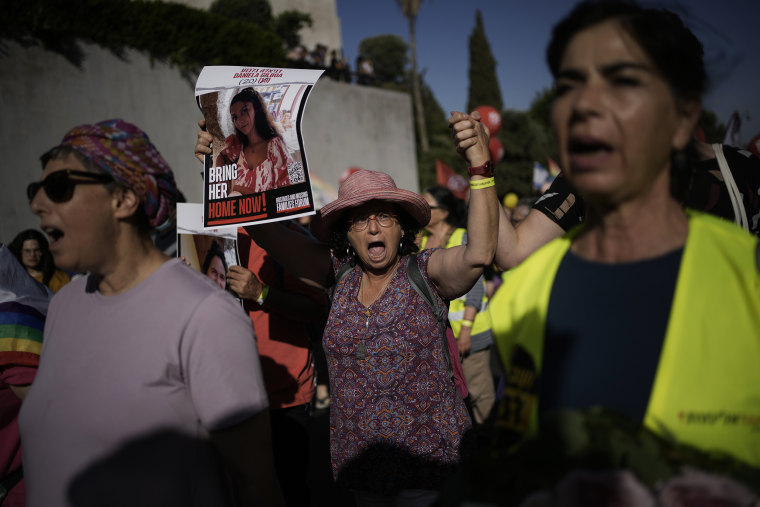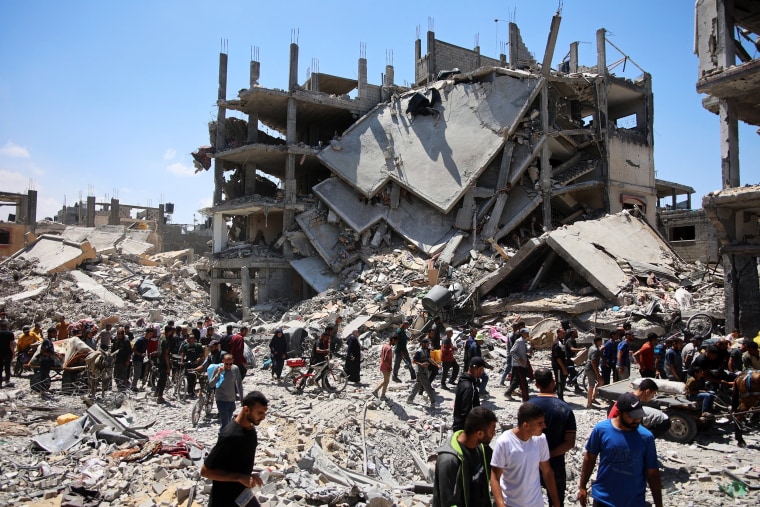TEL AVIV — Prime Minister Benjamin Netanyahu will not agree to end the war in Gaza in exchange for the release of hostages unless opinion polls show it is politically advantageous for him, a top Israeli security official told the families of those held captive, a person in the closed-door meeting and an advocacy group said Friday.
The comments by Netanyahu’s national security adviser Tzachi Hanegbi, first made public by Israel’s Channel 12 broadcaster, sent shock waves through the hostage family community nearly eight months after their loved ones were kidnapped by Hamas during the Oct. 7 attack.
“The Israeli government made a conscious and deliberate decision to sacrifice the hostages,” the Hostage Family Forum said in a statement Friday. “The hostages, and the entire State of Israel, have been taken captive by those who chose political interests over their national and governmental duty.”
Hanegbi met with relatives of the hostages at the Defense Ministry in Tel Aviv on Thursday afternoon. Among the attendees was Gil Dickmann, whose 40-year-old cousin, Carmel Gat, is among the 125 hostages still being held in Gaza.
Hanegbi “told us: ‘We understand that the only way to bring all the hostages back is through a deal that will bring an end to the war.’ And as he sees it, the Israeli government is not going to put an end to the war right now,” Dickmann told NBC News in an interview Friday.
“He said the only way to make Netanyahu do this is to make him understand that it’s going to be politically good for him, that if he sees polls that say that the Israeli public wants to see the hostages home more than it wants the continuation of the war, then he will make a deal that will bring all the hostages home,” he added. “We were shocked by this.”
In a statement released by the prime minister’s office, Hanegbi said he would not comment publicly on what was said in a closed-door meeting. “This is the proper way to have an open dialogue between the political echelon and the grieving families. I will not deviate from this tradition even after today’s meeting. Israel is obligated to bring about the release of all the abductees, and we will do so,” he said.
Cease-fire negotiations between Israel and Hamas have remained deadlocked for months over a number of issues but particularly the question of an end to the war.
Hamas reiterated its position in a statement Thursday, which said it would only release the hostages in exchange for an end to the conflict and the withdrawal of Israeli forces from Gaza.
Netanyahu has consistently said he will not agree to end the war as part of a hostage deal — framing his decision in national security terms by saying Israel is obligated to destroy Hamas and prevent the possibility of a repeat of the Oct. 7 terror attack. But Hanegbi’s comments suggest Netanyahu’s position is also guided by political considerations.

Dickmann said Hanegbi told the families of the hostages he believed it was possible that the first stage of a deal could be agreed upon, which would see the release of some hostages in exchange for a cease-fire deal lasting several weeks.
But, he said, Hanegbi also warned that once the current offensive in Gaza’s southernmost city of Rafah is completed, Israel would lose the ability to pressure Hamas, and that public attention would shift away from the enclave and the hostages and toward a potential conflict with Hezbollah in southern Lebanon.
“And so I said to [Hanegbi]: ‘That means we’re lost.’ And he replied: Yes, that’s correct,’” Dickmann said.
The Israeli military confirmed for the first time Friday that its forces were operating against Hamas in central Rafah, days after it was widely criticized for an airstrike that sparked a major fire that killed dozens of Palestinians.
The Israel Defense Forces also said it had completed an operation in Jabalia in northern Gaza, where the bodies of seven hostages have been recovered in recent weeks.

Israeli opinion polls paint a mixed picture of the public’s willingness to end the war in Gaza in exchange for the hostages, with survey results varying depending on how the question is framed.
A poll in early May for the Israeli Democracy Institute think tank found that 56% of Jewish Israelis believed that securing the release of the hostages should be Israel’s highest priority, while 37% believed the highest priority should be launching an offensive in Rafah.
But another poll for the Maariv newspaper last week found that 37% of Israelis believed Israel should agree to Hamas’ demand for an end to the war in exchange for the hostages, while 43% believed Israel should continue intensive military action in Rafah.
Netanyahu’s approval ratings, which slumped after the Oct. 7 attack, also appeared to be improving in a high-profile poll for Channel 12, which found that he had overtaken his closest rival, centrist leader Benny Gantz, on the question of who was more suited to be prime minister for the first time since the start of the war.
Gantz’s National Unity is pushing for early elections. The move came after an ultimatum Gantz, a member of Netanyahu’s war Cabinet, issued earlier this month, demanding that the prime minister agree to a day-after plan for the Gaza war by June 8.
Polls show National Unity continuing to lead Netanyahu’s right-wing Likud, but by a smaller margin than before.











